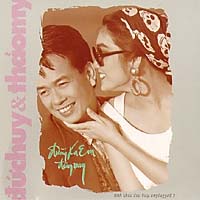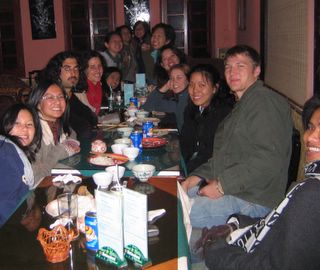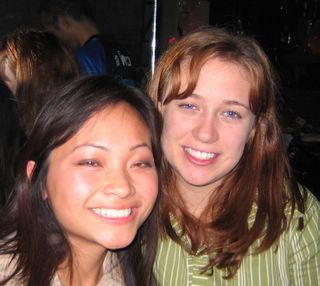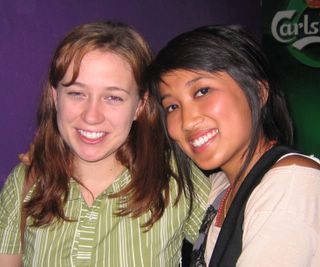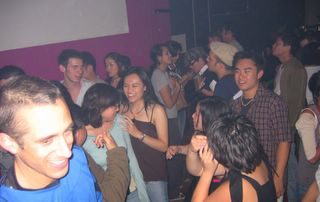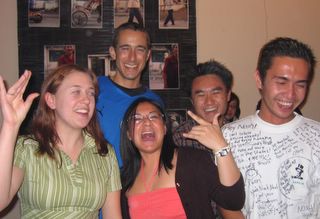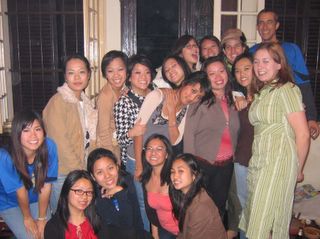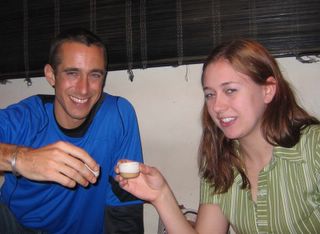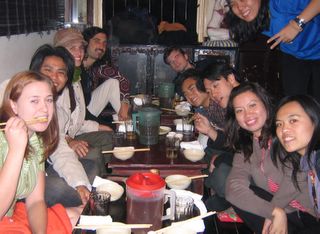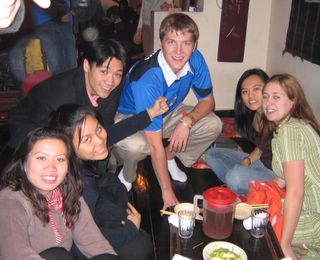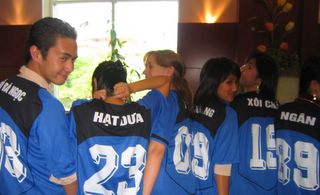Chào các anh các chį!
Wednesday, December 16, 2009
Steffyyoung.blogspot.com
Wanted to separate my blogs....
Friday, July 31, 2009
Hello? I'm trying to figure out how to blog, but all of this craziness is in Japanese. 日本語を話しません!Hehehe, wow, I said "I don't speak Japanese" and its really cool that Christina, my American friend just taught me how to write in Japanese. More to come because we are going to dinner or something. Lots to figure out, so don't expect greatness. :)
Friday, January 20, 2006

Have to add this one because it contains NOAH, a very cool character. I don't have any pics of two nights precededing this culture night at UCLA, but Saku, Noah and I went clubbing together in LA which was lots of fun. Noah and I danced and danced and danced. :)


The gals of the pre-party. Its nice being around all Vietnamese people again! Yes thats right, UCI doesn't have enough, I tell ya'! In the pic, two girls went to Vietnam through EAP in previous years, so we got to talk about the differences in the years.


Saku got angry that no one commented on his "ba ba ba" shirt. We all seemed to enjoy taking pictures outside of Royce hall even more than watching the actual show, which was good too. :)


Haven't updated my blog in a while....because DIANA STOLE MY CAMERA! But these are some pics that I stole from my friends, and as soon as I retrieve my camera I will finish off the Vietnam trip (yep, theres a few more photos to put up) and update my blog with some new exciting photos. Anyways, this is us at our mini-reunion. Some of us from the Vietnam program were able to make it to the U.C.L.A. Vietnamese culture night, and we all got to emotionally reconnect and have a great time together. I love them all!

Tuesday, December 20, 2005
Đừng xa em đêm này
I know that the title of this post will look all wierd, because blogger.com does not accept Vietnamese letters, but all I can say is I tried. Đừng xa em đêm này... or as it will accept herein, Dung xa em dem nay. :( Don't leave me tonight is how you translate that. Its the only song that I can sing perfectly in Vietnamese at Karaoke. Tonight Kim Anh, Thai and I went to dinner and then Karaoke. It was really sad. I mean, I had a good time, but it reminded me of when we all did Karaoke in Nha Trang together. "Dung xa em dem nay" is me and Huy's song, and there was no Huy to carry on the boys voice. And then I played "Smooth Criminal" by Michael Jackson, which reminded me of Eric. There was no Eric there pulling all the Michael Jackson moves. It make me realize how much I already miss everyone who is gone. And now I won't be able to get "dung xa em dem nay" out of my head all night long, and I gotta get to sleep because I'm meeting Thay Thu for coffee in the morning (like 6 hours from now)...so I better try to get to sleep. Huy, if you happen to read this, I really miss you!!!Reflective Essay
Catfish and Mandala and Familiar SpaceI sit at a café, very near my dorm, and decide to start my reflective essay with pen and paper. It’s easy enough to transcribe and my thoughts flow freely now. I reflect on the past hour: sensing Julie awake too, I asked her if she wanted to grab breakfast with me. She declined, causing me disappointment only because I could already feel the dozens and dozens of eyes that would inevitably watch me. Going along, I had a mission besides quenching my own hunger. Julie requested a bành mý. Walking, I risked accident, deciding it more important to stare at my own feet than pay attention to traffic. I pass a “xôi” stall, which is what I had been craving all morning. I had been hoping to come across this, but I continued to walk. Three ladies were already occupying all the little seats, no place left for a silly foreigner. I would have gotten it to go, but unsure of how to make my request in Vietnamese, I proceeded to the normal phở restaurant. There, all the workers already know me, and there’s a menu on the wall (my reading surpasses my speaking by far). I ordered phở bò and yet again became clearly uncomfortable because there were no open tables. I meekly sat next to a middle aged man and across from a handsomely dressed pre-teen. Eating half the bowl, quickly, I set out to find bành mý. I did not want to go to the regular stand, having felt uncomfortable due to a line of questioning regarding my finances, feeling relieved that Julie told me specifically not to go there, as she was treated rudely there a few days before. Drifting along the ally, I looked for another bành mý sign, once again sinking back into feeling uncomfortable. Quickly inspecting a sign I realized that a store had the Vietnamese sandwich, but there was a whole family sitting at the one table inside, staring at me. Who knows if they really were staring, or what they were thinking, but I retreated. Showing up at the normal lady’s bành mý stall, I asked for Julie’s favorite type and muttered "cám ơn, cô" with so little confidence in such simple words, that I’m sure it was inaudible.
This may seem like a long useless story, but I feel that it illustrates life: Andrew Pham’s life, my life, perhaps everyone’s life. Once outside of one’s zone of comfort it is difficult to fight the urge to retreat to places of normalcy. The phở restaurant and the bành mý stand are places that I am use to. Even though I did not want to go to either one, I ended up that them both because they are recognizable spaces for me. This sense of recognition is an important part of life. Often feeling brave, I go to new places, or do something different, but there are always those moments of sensitivity. Extreme moments of being faced with new paradigms makes me want to be back at home, or even return to a time when I slept in my mother’s arms…anything to avoid testing the outer limits of my personal bubble. We try to expand these bubbles, but they are impossible to escape from.
All of Vietnam is new for me. I had been to Sai Gon before, but had spend very little time exploring myself, and going few places that were not listed in the Lonely Planet. I’d imagine it much harder for Andrew than for me, because he was expecting one thing, and got another. I knew what I saw in the movies would not be my experience, so the only conception of Vietnam that I had came from vivid dreams I had in the weeks of anticipation before my trip. That trip was nice and I have good memories of my three and a half weeks in Sai Gon, but there were few tests of my strength, always being with my ex, never really needing anything to seem familiar because I had him. Coming to Ha noi was thus hard at first because I felt like I had no one to share it with. This is a different dilemma from Pham’s, but I feel that there is a connection. It was very hard for me to break away from that past and experience Vietnam for myself. Just as it was hard for Pham to realize that memory is often different from reality, so it was for me. When you spend all your time trying to connect to things that no longer exist you lose out on many experiences, and have to grapple with contending emotions.
Andrew’s journey from start to finish (although I recognize that flying back to America is not the end of his story) is filled with upsets, joys, new experiences and familiar ones. He wants to find his roots, but subconsciously he seeks a peace that he could not find amidst his ‘dysfunctional’ family. Anticipating the landing Andrew, explains what he hopes to gain out of his trip to Vietnam. “I’ve come for my memories. Give me reconciliation.” (62), which is why many people visit the lands of their birth or ancestry. Yet he realizes along his journey that the memories he came for are not there anymore. Physically Vietnam has changed since he left as a boy. He searches for recognizable places, and each time he does, it ends with disappointment. When he bikes to where he used to live, nothing looked familiar. Part of the structure had been demolished, and everything seemed new, strange, and cluttered with new forms of capitalism such as billboards and parking structures. Later, when he visited the site where his father had been imprisoned, he realized the old Minh Luong bore no resemblance to what he remembered. Both of these physical changes frightened him because his original reason for coming could not come to fruition. Pham writes about Minh Luong village: “Nothing looks familiar. I feel stupid.” He was hoping this one last sight would give his trip meaning. He had already been let down in Sai Gon, as he gave us insight into this thoughts: “Did I really believe that coming here would bring back dead memories?” (98). Without memories flowing back to him, he felt displaced, empty and confused. This seemed like one of the hardest times of his trip. It was the time he seemed most lost; A time when he was faced with the disparity between his world in America, the Vietnamese world he was visiting, and had no physical manifestations that he could use to connect the two. It is very important to note that these are the chapters when Andrew first speaks with a passionate sorrow about his sister Chi. Andrew mixes it all up…not recognizing his past, crying for the “persimmon-faced child” in the streets, and crying for Chi. At this point in the novel, his grief can not be separated.
I am just as guilty as Andrew on retreating to places of comfort. This issue goes much deeper than wanting to eat at the normal restaurant. Sometimes I want so badly to return to my dorm-room and just cry. Sometimes I feel so much grief that for a moment I wished I were back living in the bubble of Irvine, where the weather is always spectacular. Hiking to Ban Ho, near Sapa, perhaps the grief and guilt and cloud of emotions that Andrew felt for the “persimmon-faced child” is what I felt. It was perhaps the most grief and guilt I have ever felt in my entire life. Walking through one of the mini-villages, there were a few children, most of them naked, stomachs bulging from malnutrition. The oldest of them, perhaps ten years old, was flouting a needle, attached to a catheter. He was sticking it in his mouth and pretending to poke his friends with a needle! One of the Vietnamese speakers tried to tell him to get rid of it, telling him that needles are dirty. He did not listen, and after five minutes of trying to persuade them (I know we gave up too soon), we walked on. As I was walking the child with the needle came up and started pointing at my lunch which was attached to my backpack. I immediately tore the bag from my backpack and gave it to him, making sure he shared with the other couple of children. Thinking about it right now is making me cry. And honestly that makes me feel guilty all over again, because what does my crying do? Nothing. I successfully traded those children my lunch for a dangerous needle. I did not even think about making the trade until there was a child desperately pointing at my lunch. Then at lunchtime as the few who witnessed the incident tried to share their lunches with me, but I could barely eat, feeling so guilty… a general, all-over feeling of guilt. Looking back on it, what was I trying to prove by not eating one meal myself? I still made it to Ban Ho where I probably just ate twice as much for dinner. The feeling is painful, and guilt over my relative wealth bites me hard every once in while, and will probably continue to. When Andrew writes about how fate is arbitrary, and all of our roles could be reversed, it really affects me. “Fate could have switched our destinies and no one would have been the wiser” (181). In Andrews situation, suddenly hit by a new reality, with nothing to grab onto he “went alone to a bar—an expensive, exclusive, air-conditioned oasis.” (110). He retreated to a place he thought he would feel the most comfortable, to continue to work through his self-doubt, and guilt on having given up on his sister, and the starving children of the world. If there were a bar in Ban Ho, I’m sure I would have been at it that night, trying to drown out the guilt too.
The disparity between the lives of Vietnamese and Americans, Andrew seems to attribute to another type of change, apart from physical change. This is change for the sake of ‘development’. He speaks to a man named Viet who lost his soft-drink manufacturing business with the arrival of Pepsi and Coca-cola (82). Although Pham seems to refrain from making a judgment call on this, it seems as if Pham is disappointed that the Western world is so eager to capitalize on the Vietnamese people, without them receiving any benefit. Pham is also throughout the book seems to want to send a signal to all of the Vietnamese people. He wishes he could deliver a message that they should not ‘sell out’. Not everything should be about money or profit. He mentions example after example of those whom only seek profit, and tells disgusting stories of corruption and scam, such as about the German who paid one hundred dollars to have a car take him to the Cham temples, only to be told the car broke down. Yet other times he is disgusted by the tourists, who carelessly snap pictures of people in the slums. I could tell many stories relating to the feelings he held during each respective part of his narrative. Regardless of which attitude he takes at the time, I feel a general sense of Pham’s belief that Vietnam should seek to improve itself, but not in the footsteps of America, no matter how American he is. Having given up on his original self stated reason for going to Vietnam, digging up his old roots, Pham turns into somewhat of a tourist himself.
Finding Westerners easy to get along with, he spends much of his time meeting other tourists, serving as their translators, and observing many different aspects of Vietnam as he travels up and down its thin neck. He has trouble figuring out exactly where he fits, where his emotions lie. Many examples of ‘hypocrisy’ could be brought out, but he is not really hypocritical, rather he negotiates between different attitudes that are sparked by different situations. For instance, he resents the opportunism of those who smile and spark conversation with the purpose of selling something, yet he is being feels sorry for those that are poor. He resents those that have the attitude of “my country, not yours!” (313) but other times recognizes that this is no longer his country, and at the end is relived go “home”. This is natural, as it would be impossible for me to go home and say “this is the experience I had in Vietnam.” There is no one experience. Attitudes constantly change, because the world can only change. I’ve learned from the same types of encounters that Pham detailed. I have had se ôm drivers who have said “whatever you think” and then hassle and complain even though they already received a generous payment. I have had people hassle me to buy something and been forced to say “no” over a dozen times. Yet, I also have memories reflecting opposite emotions. In Sai Gon, when I tried to give extra money to a lady with glaring physical deformities, who was selling cards, she would not accept. She said “I am not a beggar. Selling cards is my job, not begging”. My stay in Vietnam has reinforced my notion that the Vietnamese don’t need my guilt or pity, rather they need respect. But my experiences will continue to create a constant emotional battle for me. I will feel guilty again, and I will feel sorry for those without as much as me again, but working through these issues and trying to build thoughtful conclusions is certainly a way to build up my defense against being living in ignorant bliss, which would be the worst thing in the world for me.
This entire essay was not written at the café near Đ8, yet it was also not written via a computer keyboard. It has been written, formulated and experienced during my entire time here, and will not be concluded when I email this out, or even when I board the plane to LAX. Andrew Pham came out of Vietnam as a changed person. By the end of his journey, Pham, an avid kilometer counter states: “The finish line seems unimportant, secondary, symbolic” (337). Now that the quarter is nearing an end, I do not know where I will set my next finish line. Perhaps graduation, perhaps marriage, perhaps one need not be set. Andrew is right, the finish line is unimportant. Between point A and point B, there is infinite change, and I have learned to accept that more and more. Point B will move to point C, and C to D. My spaces, my friends, my experiences have shaped my viewpoints, and they will continue to be shaped. I can only say that EAP will quintessentially remain the best experience of my life, if I were to be able to deconstruct my life onto a neat set of spectrums and scales. Just as Andrew describes how the people around him affect his view of the country, I will replace a word to meet my needs: “In [EAP’s] company, I like the country more” (293), and I hope to take home not just memories, but lasting friendships. When I return to Vietnam, which I certainly will, I will not expect the same experiences; I will not reach for re-living what can not be re-lived. As Pham realized, trying to hold onto the past is dangerous. I will continually learn, have better language skills, and not be afraid of being myself. I might even stop for xôi from whoever stares at me the most.
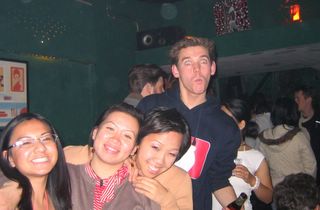
And of course I will always miss the crazy Australian guys. This one is Martin, one of the first people I met in Vietnam, outside of EAP. Stay crazy!

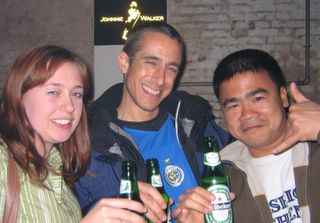
Last night at the toilet, thank heaven. I've never liked this bar/club but I had a lot of fun anyways. hehe. At the end of the night when all of us EAPers were the only ones left, we were just singing and singing, and the bar owners were like "this isn't a kareoke joint"...it was really funny. We were eventually kicked out about 4:00am. No police tonight to rain on our parade...

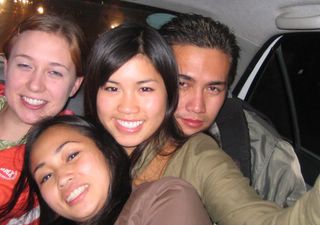
This is our last taxi ride, from dinner to Dragonfly. There is actually someone to the right of me, Christie Dam I think. Five people in the back of the taxi...thats nothing. We in EAP are famous for fitting up to 8 people in one 4 person taxi. :) I don't know if I'm exaggerating, but we always squish.

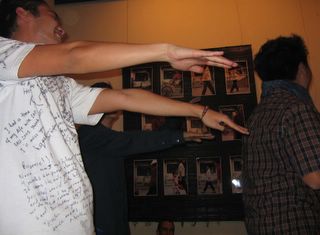
At the last dinner, there was an aftershow. hahaha. it was so freaking hilarious. Tan sang N'sync's "Bye bye bye" in Vietnamese...and Noah and Don were his backup dancers. It was the most hilarious moment ever.

Monday, December 19, 2005
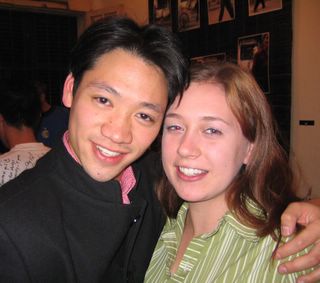
Huy's a cutie. He had a local girlfriend during almost the entire program though, so lucky her! I feel so sad for everyone that had a local significant other, because leaving must be that much harder. And I thought I had it bad...

Home on Friday!
More pics to come, but time for pizza with Gerard and those of us still left, and then "Fight Club". Never actually seen it, so I can't wait to see Brad Pitt in action. Not our normal "Bia Hoi" Monday night, but these are different circumstances. Half of us went home.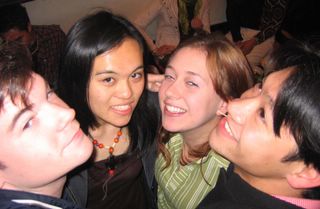
This is the happiest pic I have. From here on, we all start crying, and its hard to find pics this happy. It was worse than high school graduation in terms of emotions...

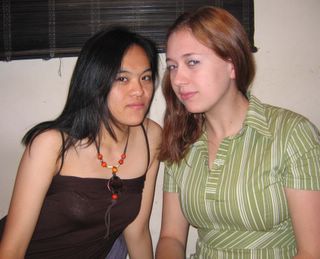
And here begins our last dinner. Saturday night festivities....About half of the people left early Sunday morning, and now people keep slipping out....I'm actually here in Ha Noi for a while, comparitively to most other people. I need my time to say goodbye to the city. Here's me and Rose, trying to look cute. I think only Rose succeeded. Our last dinner here was really great.

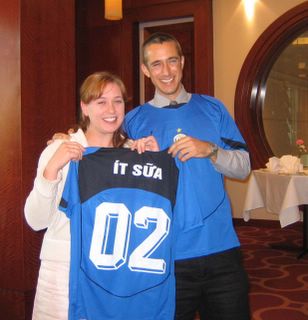
YAY!! Gerard gives us our soccer jersey's. I'm "It Sua" which means "little milk"....referring to the fact that I always order "Ca phe it sua da" which means "ice, coffee with only a little bit of condensed milk"...Lots of us got food names. So from now on, call me "it sua" or nothing. I'm going by that now. hahah. Xuan is Bun Bo Hue, lets see, someone is pho xao....It sua, It sua, It sua. :)


